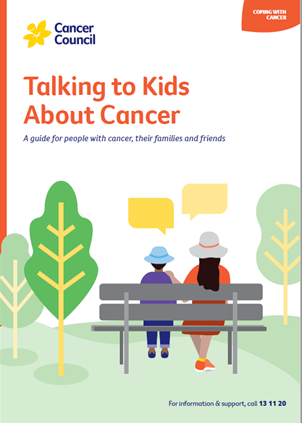- Home
- About Cancer
- Advanced cancer
- Facing end of life
- Emotional and spiritual needs
- How to tell children
How to tell children
If you have children or grandchildren, telling them that you are dying will be difficult. There is no easy way to approach this conversation, but it is important to let them know what is happening.
Like adults, children of all ages need time to prepare for the death of someone close to them. It’s natural to want to protect children, but they will often sense that something has changed. Not sharing the prognosis can add to their anxiety – and yours.
Talking to children about death in an open way may help them to feel more comfortable spending time with someone who is dying. For older children, the chance to make amends for mistakes may be important.
Talking to children and grandchildren about death
How you tell children or grandchildren will depend on their age, but these suggestions may help:
- It may be easier to have your partner or a support person with you when you have the initial discussion.
- Be honest with children and explain the situation using straightforward words, such as “dying” and “death”. Avoid terms such as “pass away” or “going to sleep”, which can be confusing or alarming for them.
- Keep your explanations as simple as possible, and be guided by their questions so you don’t offer more information than they may want or can handle.
- You may ask children what they know about death and what they think it means. This can help you to clear up any misconceptions about death.
- Depending on their age, children may benefit from seeing a counsellor or play therapist.
Learn more about talking to kids about cancer, call 13 11 20, or listen to the podcast below.
→ READ MORE: Coping with change and loss
Podcast: Explaining Cancer to Kids
Listen to more episodes from our podcast for people affected by cancer
Prof Jane Phillips, Head, School of Nursing and Professor, Centre for Healthcare Transformation, Queensland University of Technology and Emerita Professor Palliative Nursing, University of Technology Sydney, NSW; Prof Meera Agar, Palliative Care Physician, Professor of Palliative Medicine, University of Technology Sydney, IMPACCT, Sydney, NSW; Sandra Anderson, Consumer; A/Prof Megan Best, The University of Notre Dame Australia and The University of Sydney, NSW; Prof Lauren Breen, Psychologist and Discipline Lead, Psychology, Curtin University, WA; David Dawes, Manager, Spiritual Care Department, Peter MacCallum Cancer Centre, VIC; Rob Ferguson, Consumer; Gabrielle Gawne-Kelnar, Counsellor, Psychotherapist and Social Worker, One Life Counselling & Psychotherapy, NSW; Justine Hatton, Senior Social Worker, Southern Adelaide Palliative Services, Flinders Medical Centre, SA; Caitlin MacDonagh, Clinical Nurse Consultant, Palliative Care, Royal North Shore Hospital, Northern Sydney Local Health District, NSW; McCabe Centre for Law and Cancer; Palliative Care Australia; Belinda Reinhold, Acting Lead Palliative Care, Cancer Council QLD; Xanthe Sansome, National Program Director, Advance Care Planning Australia; Kirsty Trebilcock, 13 11 20 Consultant, Cancer Council SA.
View the Cancer Council NSW editorial policy.
View all publications or call 13 11 20 for free printed copies.
